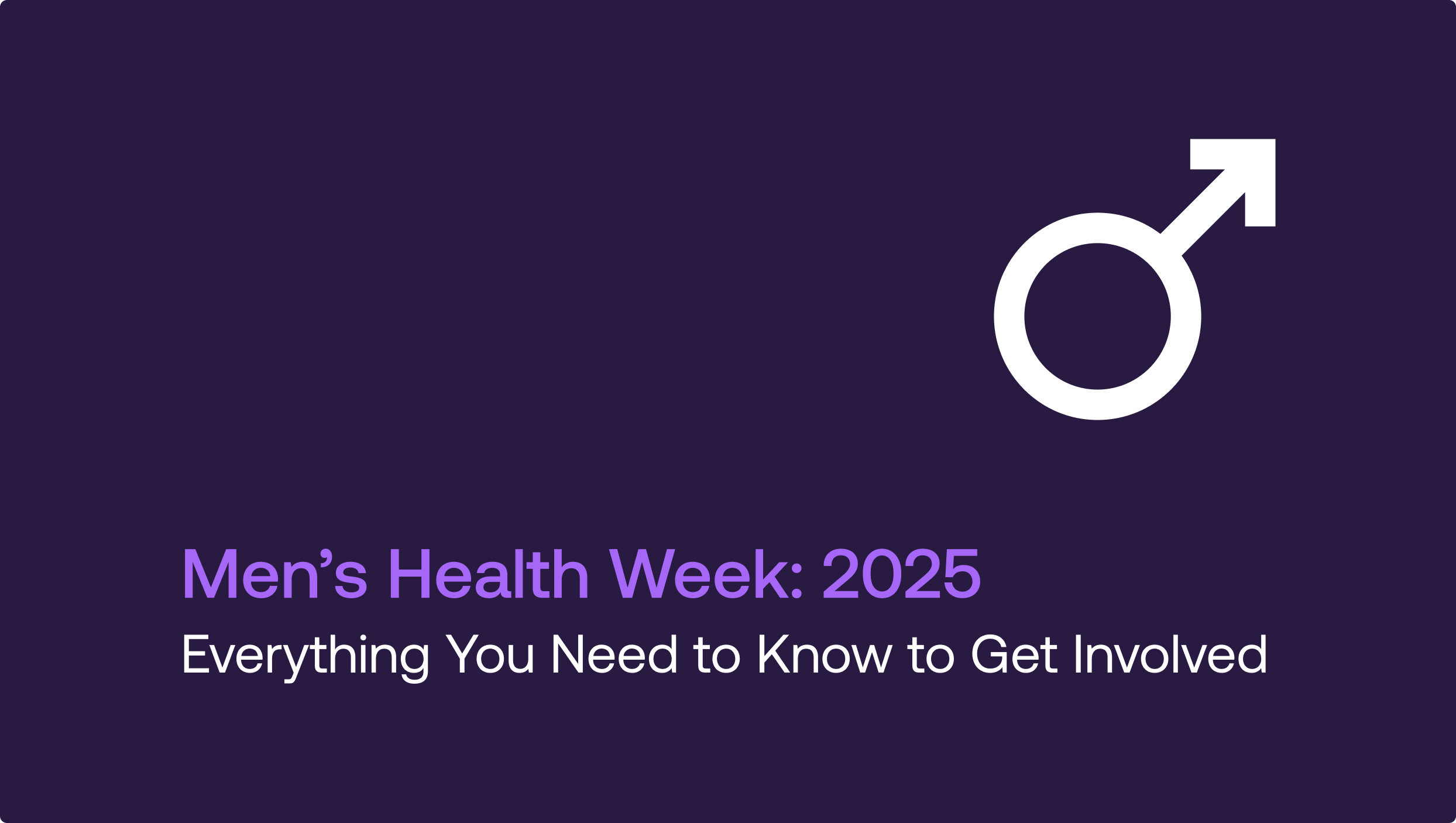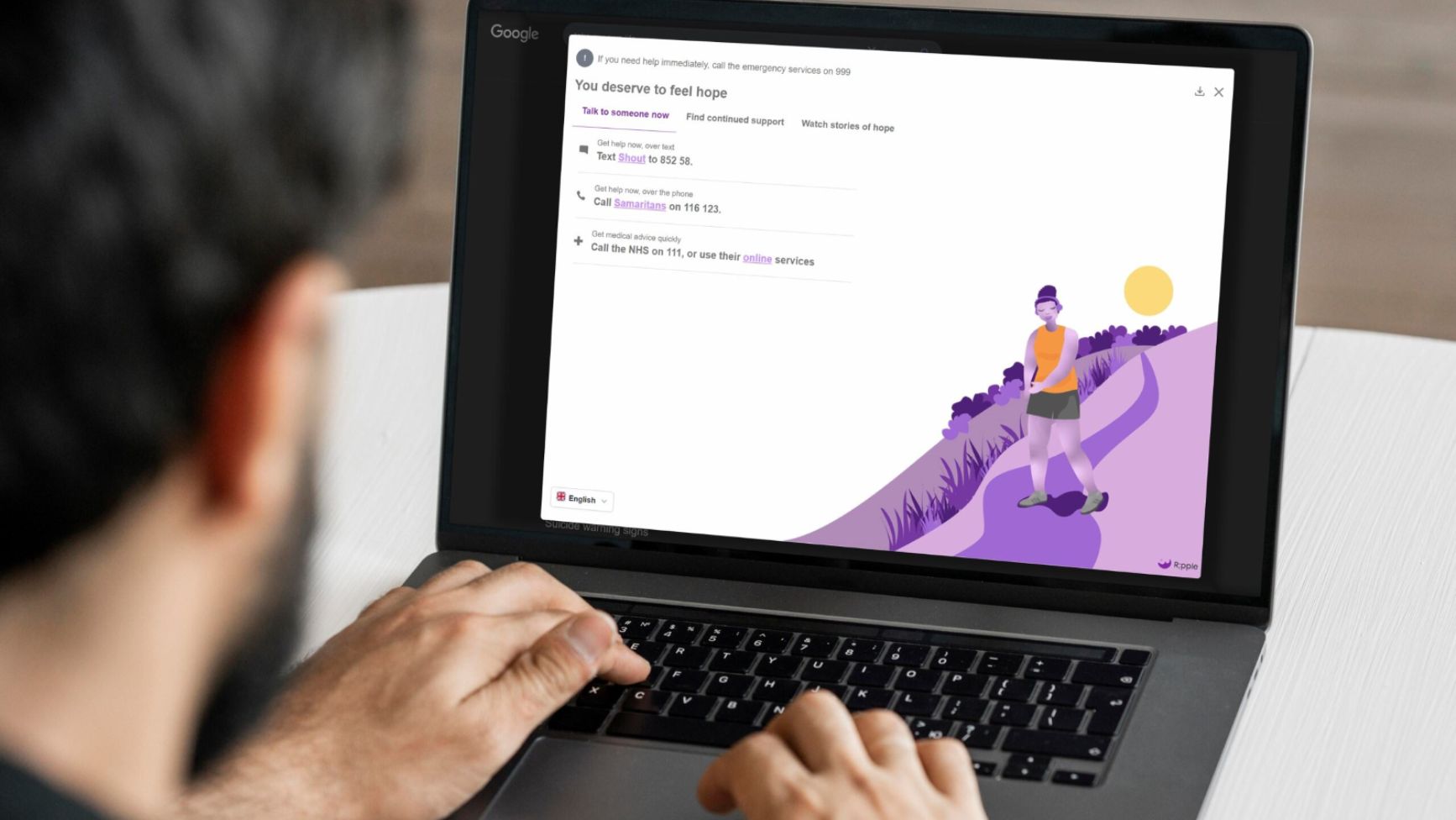

Each year in June, Men’s Health Week is an opportunity for you – as a HR or wellbeing expert – to put the spotlight on the physical and mental challenges men face.
Men are more likely to suffer in silence when it comes to both their physical and mental health. These disparities can be compounded by stigma, expectations and practical barriers to care. Perceptions of masculinity exacerbate the challenge, leading to poor health outcomes for men1.
Designed to create awareness and action, this week is a powerful platform for both employers and individuals to engage with men’s health in a way that drives long-term change. Your participation could improve and even save lives.
In this article, you'll learn everything you need to know about Men’s Health Week 2025, including why it’s so important and why it is so closely linked to Ripple’s mission. So, whether you’re a wellbeing leader, skilled HR coordinator or passionate mental health advocate, this guide is for you.
When is Men's Health Week 2025?
Celebrated internationally, Men’s Health Week aims to give boys and men access to the information they need to maintain their health. Notably, this event is dedicated to health issues that disproportionately impact men.
It’s held annually in the week leading up to Father’s Day, and this year Men’s Health Week runs from 9-15 June 2025.
What's the theme for 2025?
This year, Men’s Health Forum are focused on ensuring the government progress and deliver an effective Men’s Health Strategy for the NHS2.
"The Government has promised both. We need to make sure they get it right. So, for Men's Health Week 2025, we'll be talking about why we need a Men's Health Strategy and what it needs to include,” writes the Men’s Health Forum.
As part of this, the forum will be producing a simple guide3 on how the NHS currently provides gender-based support for men (and women).
Previous campaigns have discussed issues like mental health stigma, suicide prevention, cancer awareness and more. Regardless of the specific focus of each year, the goal remains the same: helping to close the gender health gap by empowering men to take control of their health and wellbeing.
Why is Men's Health Week important?
In the UK, one in five men dies before they reach the age of 651. However, there is nothing inevitable about premature death among men. With the right policies and health services in place this does not have to be the case.
The following statistics illustrate the need for better awareness and accessible male health services:
- Men are three times more likely to take their own lives4
- Men are nearly twice as likely to die prematurely from diabetes5
- Men are 67% more likely to die from common cancers5
When we talk about men’s health, mental health must be as visible as physical health. Poor mental health can lead to physical illness, impact sleep, increase risk-taking behaviours, and can reduce the chances that men will engage with support. This isn't just down to biology, it's rooted in social stigma, cultural expectations, and a tendency for men to suppress emotional distress. This can lead to devastating outcomes for individuals, families, and workplaces.
As The Men’s Health Forum say powerfully: “We’re not asking you to look at images of pity, we’re just asking you to look around at the society you live in, at the men you know and at the families with sons, fathers and grandads missing.”
It’s also important to note that Men's Health Week is not ‘men vs women’ but an opportunity to draw attention to an often-neglected health inequality.
How to get your organisation involved in Men's Health Week
This awareness week aims to empower men to take control of their health, and organisations are a key part of this puzzle.
Men’s Health Week is an opportunity for organisations to do their bit so that more men can speak up when they are experiencing poor health, be it physical or mental. This is crucial because men are less likely than women to seek help for these concerns6, leading to worse care outcomes and knock-on impacts on employers.
Luckily, there are many ways to drive awareness, action, and get involved in this year’s Men’s Health Week. To help you out, we’ve collated the resources you’ll need below.
1. Unlock leadership support
Leaders within organisations are role models and culture starts from the top down. As a result, securing leadership buy-in is a huge advantage when running any internal awareness campaign.
When senior leaders actively engage, it sends a clear message that health – and to some extent vulnerability – are not at odds with professionalism.
Identifying one leader with a resonant story which links to male health and encouraging them to share this through a webinar, email or meeting can be a powerful human way to drive awareness. Importantly, the illnesses discussed in this article affect all of us, so it does not necessarily need to be a male who is sharing their story.
For insider strategies to secure leadership buy-in for wellbeing, read this article from Forbes7. While not directly related to Men’s Health Week, the tips here should give you useful direction to generate that important buy-in.
2. Get involved through the Men’s Health Forum
Over the past two decades, the Forum has focused on all sorts of issues for Men’s Health Week and should be your go-to resource for news and updates (don’t forget to sign up to their newsletter).
As discussed, this year the theme is all about the NHS Men’s Health Strategy. But as the Forum notes: “if that’s not for you, you have the pick of all the materials we’ve produced down the years." We particularly recommend the Men’s MOT exercises from 20228.
Finally, the forum has also created two new training courses which align with the mission of Men’s Health Week3.
3. Donate
Charities can only exist with support from individuals and organisations. That’s why Men’s Health Week can be a powerful platform to raise funds across a wide range of connected charities.
You can use this awareness week to donate directly to the Men’s Health Forum or raise money for any charity which is close to your heart. You can also run a fundraising campaign in support of Ripple and our mission to save lives.
Whether you’re donating, organising a fundraising event, or taking on a challenge, there are countless ways to support Ripple and help us protects individuals from dangerous online content. Here are some ways our supporters have already got involved:
- Take on the mammoth task of hiking Mount Snowdon fundraising for Ripple
- Team up for a charity football tournament (Like West Ham United did!9)
- Follow Smart Money’s lead and choose Ripple as a charity partner
Find out more about ways to get involved and support Ripple on our donations and fundraising page.
4. Communicate your existing support
Take advantage of Men’s Health Week to drive awareness to your existing support – this could be your private medical insurance (PMI), Employee Assistance Programme (EAP), or employee benefits platform.
As you’ll know, these services are often hugely underutilised; this is an opportunity to increase engagement and remind your people of their existing support.
Any internal communication campaign (no matter how simple) can be daunting. For more information on running a successful one, take a look at this helpful article from HR Grapevine10.
5. Install Ripple to protect your staff
Sadly, men are three times more likely to take their own lives and many - like Josh, Ripple’s reason - will use the internet as part of this.
Josh was just 21 when he died. He had been struggling with his mental health and had been using the internet to research ways to end his own life. This is why Ripple exists: to transform harmful searches into a journey of hope and save lives. Ripple’s founder, Alice Hendy MBE, explains her story in the video below.
For employers, installing the Ripple tool across workplace devices and Wi-Fi networks provides a vital lifeline at the very moment someone may be struggling in silence.
If an individual searches for a flagged keywords or phrase related to self-harm, suicide and a broad range of mental health challenges - like substance misuse, financial struggles, eating disorders and more - the tool intercepts the search and signposts to free, 24/7 mental health support.
Ripple is already in action across millions of devices, including predominantly male environments like the Football Association (FA) and premier league clubs including West Ham United. Your organisation could be next to deploy Ripple and save lives.
The Ripple tool is available to businesses and public-sector organisations at a subscription fee which allows us to follow our social mission and keep it free for individuals, families, educational establishments and charitable organisations. Get in touch now to discover Ripple.

Sources:
1. National Life Tables, ONS
2. Men's Health Strategy, Gov.uk
4. Latest Suicide Data, Samaritans
5. Five Surprising Facts, Men's Health Forum
6. Men and Women Statistics, Mental Health Foundation
7. Insider Strategies To Secure Leadership Buy-In For Wellbeing, Forbes
8. MHW 22: Time for your MOT, Men's Health Forum
9. West Ham United team up with Ripple
10. Compelling communication campaigns in six steps, HR Grapevine
Our Sponsors and Supporters

















